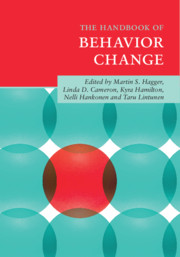Book contents
- The Handbook of Behavior Change
- The Handbook of Behavior Change
- Copyright page
- Dedication
- Contents
- Figures
- Tables
- Sidebars
- Contributors
- 1 Changing Behavior: A Theory- and Evidence-Based Approach
- Part I Theory and Behavior Change
- 2 Changing Behavior Using the Theory of Planned Behavior
- 3 Changing Behavior Using Social Cognitive Theory
- 4 Changing Behavior Using the Health Belief Model and Protection Motivation Theory
- 5 Changing Behavior Using the Common-Sense Model of Self-Regulation
- 6 Changing Behavior Using the Model of Action Phases
- 7 Changing Behavior Using the Health Action Process Approach
- 8 Changing Behavior Using Self-Determination Theory
- 9 Changing Behavior Using Control Theory
- 10 Changing Behavior Using the Transtheoretical Model
- 11 Changing Behavior Using Integrative Self-Control Theory
- 12 Changing Behavior Using the Reflective-Impulsive Model
- 13 Changing Behavior Using Habit Theory
- 14 Changing Behavior by Changing Environments
- 15 Changing Behavior Using Integrated Theories
- 16 Changing Behavior Using Social Identity Processes
- 17 Changing Behavior Using Ecological Models
- 18 Changing Behavior Using Theories at the Interpersonal, Organizational, Community, and Societal Levels
- Part II Methods and Processes of Behavior Change: Intervention Development, Application, and Translation
- Part III Behavior Change Interventions: Practical Guides to Behavior Change
- Index
- References
3 - Changing Behavior Using Social Cognitive Theory
from Part I - Theory and Behavior Change
Published online by Cambridge University Press: 04 July 2020
- The Handbook of Behavior Change
- The Handbook of Behavior Change
- Copyright page
- Dedication
- Contents
- Figures
- Tables
- Sidebars
- Contributors
- 1 Changing Behavior: A Theory- and Evidence-Based Approach
- Part I Theory and Behavior Change
- 2 Changing Behavior Using the Theory of Planned Behavior
- 3 Changing Behavior Using Social Cognitive Theory
- 4 Changing Behavior Using the Health Belief Model and Protection Motivation Theory
- 5 Changing Behavior Using the Common-Sense Model of Self-Regulation
- 6 Changing Behavior Using the Model of Action Phases
- 7 Changing Behavior Using the Health Action Process Approach
- 8 Changing Behavior Using Self-Determination Theory
- 9 Changing Behavior Using Control Theory
- 10 Changing Behavior Using the Transtheoretical Model
- 11 Changing Behavior Using Integrative Self-Control Theory
- 12 Changing Behavior Using the Reflective-Impulsive Model
- 13 Changing Behavior Using Habit Theory
- 14 Changing Behavior by Changing Environments
- 15 Changing Behavior Using Integrated Theories
- 16 Changing Behavior Using Social Identity Processes
- 17 Changing Behavior Using Ecological Models
- 18 Changing Behavior Using Theories at the Interpersonal, Organizational, Community, and Societal Levels
- Part II Methods and Processes of Behavior Change: Intervention Development, Application, and Translation
- Part III Behavior Change Interventions: Practical Guides to Behavior Change
- Index
- References
Summary
Social cognitive theory focuses on the reciprocal interaction of the person, environment, and behavior and provides a description of the ways in which individuals initiate and maintain behaviors, taking into consideration their social environment. The main operative constructs in the theory are outcome expectancies and self-efficacy. Outcome expectancies pertain to the anticipated consequences of one’s actions. Self-efficacy reflects a subjective estimate of the amount of personal control an individual expects to have in any given situation. The theory has been applied as a basis for changing behavior in a wide variety of disciplines and settings, including sport, education, career and occupational development, and mental and physical health settings. Interventions have targeted change in self-efficacy, outcome expectancies, or both, assuming that an improvement in these beliefs translates to changes in behavioral outcomes. A considerable body of evidence supporting theory predictions has accumulated. Research has underscored the beneficial effects of such interventions on target behaviors and outcomes such as academic achievement, career promotion, job search, smoking cessation, participation in physical exercise, and eating a healthy diet across a broad array of populations and settings. The theory has been influential in the development of other theories that have adopted parts of it, in particular, the self-efficacy construct.
Keywords
- Type
- Chapter
- Information
- The Handbook of Behavior Change , pp. 32 - 45Publisher: Cambridge University PressPrint publication year: 2020

